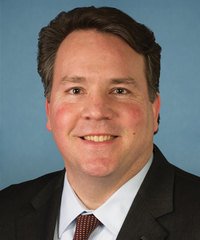
Congressman Alex X. Mooney and his wife, Dr. Grace Mooney, live in Charles Town in Jefferson County with their three children. Their third child, Gabrielle, was born in Charleston, West Virginia in October 2014. The son of a Cuban refugee and Vietnam veteran, Alex grew up with a deep sense of appreciation for the American ideals of individual freedom and personal responsibility.
Alex’s mother, Lala (Suarez) Mooney, was born and raised in Fidel Castro’s Cuba, where she was thrown into jail for seven weeks for opposing Castro’s communist regime. When she was 20, Lala escaped Cuba and fled to America to restart her life.
Alex’s father, Vincent, was sent to Vietnam when Lala was expecting their first child. He served as an Engineering Captain and was awarded the Bronze Star.
As the son of a Vietnam War veteran, Congressman Alex Mooney believes we must prioritize the health and well-being of our service members, veterans, and their families. Since taking office in January 2015, Congressman Alex Mooney has helped the House of Representatives pass more than 26 veterans-related pieces of legislation aimed at, improving Veterans Affairs (VA) and other services, increasing economic opportunity, and honoring our veterans.
Improving Services:
Congressman Mooney is a cosponsor of H.R.577, which would ensure that veterans living in rural areas, more than 40 miles driving distance from the nearest VA facility, would be able to obtain quality healthcare at local facilities.
Congressman Mooney is also a cosponsor of H.R969, the Blue Water Navy Vietnam Veterans Act. This bill would extend coverage and associated benefits with “Agent Orange” exposure to an additional group of Vietnam veterans.
Congressman Mooney worked with both sides of the aisle in Congress to pass H.R.1994, the VA Accountability Act. This bill would bring increased accountability to the VA and institute a comprehensive process for handling complaints by whistleblowers.
Helping West Virginians cut through bureaucratic red tape is just as important as passing the right legislation in Congress. Since May 2016, Congressman Mooney has proudly hosted a disabled veteran, Jon, through the Wounded Warrior Program to better help open doors for veterans returning home to West Virginia.
Increasing Economic Opportunity:
Congressman Mooney helped pass two bills into law that help veterans reintegrate into civilian life. The first, H.R.2835 – Border Jobs for Veterans Act, improves efforts of the Department of Homeland Security to employ veterans as Customs and Border Protection Officers.
Also signed into law, H.R.2499 – the Veteran Entrepreneurship Act, reduces fees on veterans and their spouses taking out loans through the Small Business Administration. Congressman Mooney knows that veterans have acquired important leadership and problem solving skills through their military service that can be used to help grow jobs and business opportunities in West Virginia.
Congressman Mooney is also a cosponsor of H.R.1818 – Veteran Emergency Medical Technician Support Act. This legislation would help streamline procedures to assist veterans who have completed military emergency medical technicians (EMTs) training to meet state standards to become EMT certified.
Honoring Our Veterans:
Congressman Mooney cosponsored and voted for H.R.1475 – Korean War Veterans Memorial Wall of Remembrance Act. This bill, which passed the House of Representatives, would improve the Korean War Veterans Memorial by listing the names of our service members who died in theatre in the Korean War.
Given the 2015 terrorist attack in Chattanooga, TN, it is a dishonor to our veterans and a disservice to our communities to continue placing restrictions on the gun rights of law-abiding trained veterans who wish to legally own firearms. That is why Congressman Mooney introduced H.R.2246, the Firearms Interstate Commerce Reform Act with House Majority Whip Steve Scalise.
Their bill would remove burdensome regulations on the Second Amendment rights of law-abiding citizens, including members of the military and their spouses. It would loosen restrictions on the ability of these individuals to purchase firearms in their state of legal residence and the state in which they maintain a home.